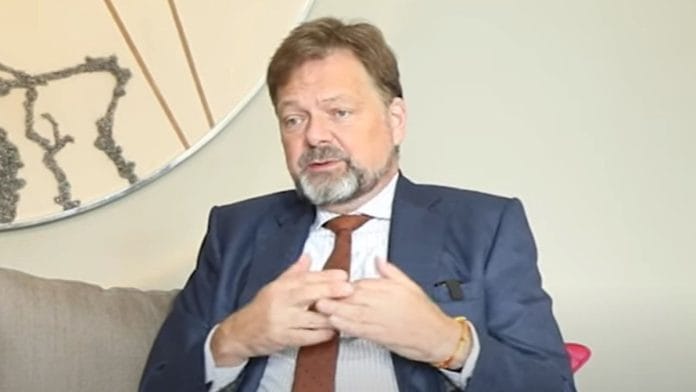New Delhi: The liberal order in Germany is not collapsing, according to German ambassador to India Dr Philipp Ackermann, despite the doubling of the far right’s vote share in the country’s federal election on 23 February.
Speaking to ThePrint, Ackermann said that the German elections, which took place seven months in advance, were significant because of their high voter turnout of 83 percent—a clear sign that the German people wanted their voices heard.
But a divided Germany has emerged from this election, which was full of both suspense and surprises.
The conservative Christian Democratic Union (CDU) won, which means their leader Friedrich Merz—who once challenged former Chancellor Angela Merkel for the party’s leadership—is likely the next Chancellor. But the far-right Alternative for Germany (AfD) also made significant gains, coming in second with 20 percent of the vote share.
“Given our history, this is a development that many see as very dangerous or unfortunate,” said Ackermann. “But we should not forget, however, that 80 percent of Germans voted for non-extremist parties.”
Saying that he cannot see the liberal order imploding in Germany, he added that most of the German public voted to keep this liberal order intact.
Ackermann also said that Merz is unlikely to form a coalition with the AfD, especially with the ‘firewall’—known in German as the Brandmauer—against the far right in place. The firewall refers to the general consensus in the Bundestag to not work with the far right, a post-war taboo in German politics.
Merz, a businessman who has never actually been a government minister, is in an interesting position. He has to build a coalition by Easter and is on track to do so with the Social Democratic Party (SPD)—led by outgoing Chancellor Olaf Scholz. The CDU has shifted further right under Merz’s leadership.
The role of the US
Merz, who has traditionally supported the United States of America, also made several radical comments after the elections indicating a shift in the relationship between the US and Europe—he even said that America seems “indifferent to the fate of Europe”.
Ackermann said, however, that the alliance between Europe and America is “very deep”.
“Merz will invest a lot in Germany’s relationship with America, it is in our DNA,” he said. “We want this relationship to work. We have to now find ways to deal with the fairly new American government.”
Calling for greater unity, Ackermann said that Europe needs to work together and come closer under these circumstances.
Europe seems to be considering rapid realignment after the Munich Security Conference, which took place on 14 February—in part because of the speech made by US Vice President JD Vance. Vance essentially criticised the exclusion of far-right parties in European politics, shocking several of the leaders in the room and tacitly signalling American support for the AfD barely ten days before the German elections.
“It is true that JD Vance made a speech in Munich that was not very well received by the European public,” said Ackermann, adding that while it is Vance’s right to say what he wants, it should be left to the public to decide who to include in their political landscape. “There is no need for other democracies to give us lectures on our democracy.”
Even billionaire Elon Musk, CEO of Tesla and head of the US Department of Government Efficiency (DOGE), declared his support for the AfD. However, Ackermann said that this did not have much impact on German voters—even as pollsters registered surprise at the surge of votes for the far left, which did surprisingly well in the election.
The impact on India
Ackermann said that he has no doubt there will be continuity in Germany’s foreign policy approach towards India under Merz’s government.
“We will see that the shift towards India that Germany has undergone in the last couple of years will continue.”
He also said that the “people-to-people” bond between Germany and India will continue to grow and that India is an important source of highly-skilled immigration to Germany.
“We feel that India is one of the major partners we have outside of the European Union, and we will certainly increase our cooperation with India,” he said. “And this is in the context where more and more Indians come to Germany to work and live.”
(Edited by Radifah Kabir)
Also Read: Europe is imploding. Blame liberals for German elections, not Nazi terror






